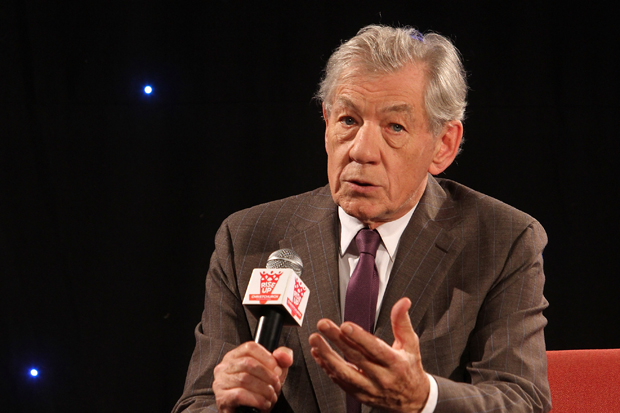Imagine what Brennig Davies must have felt like just before 11 o’clock last Tuesday evening. The 15-year-old was about to hear Ian McKellen reading his prizewinning short story nationwide on Radio 1. The voice of Gandalf broadcasting words that have emerged from your own head must have been a spooky moment for Davies, whose story ‘Skinning’ had just won the BBC’s Young Writers’ Award (organised with the Book Trust). This new venture (attached to the BBC National Short Story Award, which was also announced last week, the winner being Jonathan Buckley) in some way makes up for the fact that there is now virtually no programming for children on the BBC’s radio networks; no way for them to learn how to listen, to be drawn in to a world suggested in sound and then created in the imagination.
In Brennig Davies’s story, a young teenager is asked by his Dad to skin a just-killed, still-warm rabbit. It’s to help him grow up, ‘become a man’. At first the boy flinches, but then something takes him over, which Davies describes with the kind of honesty only young people can have, unfiltered by experience. ‘Skinning’ is an astonishing story, Brennig using very few words to conjure up the scene. Yet every necessary detail was graphically described (you could tell this was written by a teenager, Brennig not holding back, not afraid to linger on the gore). But there was more to it than mere description, as this new young writer created the sensation of what it feels like to leave childhood behind. The ending, too, was clever, toying with us as readers in a way that was not entirely comfortable.
McKellen obviously relished every word (you can watch him on iPlayer, not just reading but performing behind the mike, although there’s no real need because all his movement, his facial expression, is there in the voice). It was a shame that Radio 1 chose to put out the reading so late, although for its target audience I suspect the schedule hardly matters. They’ll tune in whenever suits them. But if you missed it, it’s worth going online not just to hearMcKellen’s stellar performance, but mostly for the excitement of hearing such talent, such clever writing, from someone so young.
Kate Clanchy gave us more young voices on Saturday night’s edition of Between the Ears, produced by Jonquil Panting (Radio 3). Clanchy, an award-winning poet and novelist, runs poetry workshops at a comprehensive school in Oxford where the pupils speak 54 different languages. Not the kind of poetry we learnt at school, she promised us, the kind of poems which ‘live on beaches, on moors, in the wild west wind’. But verses that emerge from ‘the flip of a fire door, the crack of a ball, the water of voices quenched by the bell’.
We heard her encouraging her young poets to write about home, what it means to them, calling down their poems by beginning with a simple list. The things that are in your street. Or in a street you once knew. We could hear them working, not just pencil against paper, but the eerie sound of brains thinking, churning through words and images. And, said Clanchy, ‘the breath of lost countries fills the room’.
Then they read for us, her pupils, their young voices often at odds with what they were saying, strings of words that were heavy with meaning, full of an understanding that was inspiring. The boy from Bangladesh talked of ‘hot spicy dahl’ and ‘the hot polluted air of the country I lived in’. He read, ‘My poem burns the tip of my tongue.’ His poem, he says, is about ‘young farmers in a watery land under the intense heat, / Being wrapped in a cloak of frustration and hunger.’ That’s why, he says, ‘My poem is my country, / My home country, / And my country is poor.’
He read with such fluency, such conviction, and his words were so raw, so direct, they cut through the air and cast out the memory of National Poetry Day, celebrated last Thursday on Radio 4 with a day-long bundle of programmes. I really wanted to like this: a day of poetry interrupting and blowing open the schedule. And perhaps I would have done if it hadn’t been presented by Andrew Marr and been called We British. The combination made it sound like one of those big-themed TV series, the drama heightened by a bit of patriotic flag-waving. It also broke all the rules of poetry reading on radio, which is never, ever let normal, ordinary people do the reading. Either get the poets themselves (difficult, I know, when they’re dead) or make sure you ask the finest readers to do it, because it’s jolly hard to get right and especially when you’re behind a mic. In the Victorian section (the day went from Chaucer to Kate Tempest) we were harangued, cajoled and bludgeoned into appreciating Thomas Hardy’s ‘The Darkling Thrush’ while every so often there was a blast of the kind of Sensurround music more usually associated with natural-history programme
Got something to add? Join the discussion and comment below.
Get 10 issues for just $10
Subscribe to The Spectator Australia today for the next 10 magazine issues, plus full online access, for just $10.
You might disagree with half of it, but you’ll enjoy reading all of it. Try your first month for free, then just $2 a week for the remainder of your first year.





![British poet Salena Godden presenter of Mrs Death Misses Death on Radio 4. [Photo: Roberto Ricciuti / Getty Images]](https://www.spectator.com.au/wp-content/uploads/2018/12/Radio.jpg?w=620)








Comments
Don't miss out
Join the conversation with other Spectator Australia readers. Subscribe to leave a comment.
SUBSCRIBEAlready a subscriber? Log in